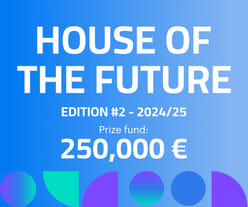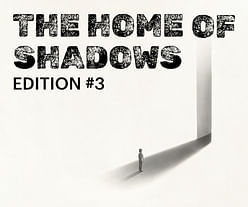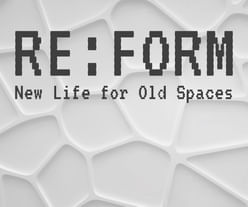

The results from the new Buildner UNBUILT Award contest have been shared with Bustler. The inaugural competition gives architects a platform to showcase their unrealized work. Winners shared an incredible €100,000 ($104,000 USD) cash prize.
Buildner states: "By honoring unbuilt ideas, we celebrate the purest form of creative exploration, unbounded by practical constraints. These designs push the boundaries of architectural thought, inspiring new approaches to form, function, sustainability, and innovation while serving as catalysts for advancing architectural discourse and future projects."
Neri&Hu’s co-founder Lyndon Neri and Mecanoo's leader Francine Houben led the eight-member jury to select winners of the student award, best presentation award, and the three €20,000 ($20,800 USD) small-, medium-, and large-scale category winners. Joining them were five honorable mention ideas. The deadline to register for the 2025 Unbuilt Award competition is October 30th, 2025.
Small-scale category winner: Loa's black line by Javier Andrés Bascunan Morales (Chile)

Jury feedback summary: "Loa’s Black Line is a spatial intervention along the Loa River, the longest in Chile, spanning 440 kilometers from the Andes to the Pacific Ocean. Set in the Atacama Desert, the project engages the immense isolation and contrast of the environment, creating a contemplative space within a natural ravine. A narrow, 70 cm-wide incision is cut into a cliff face, leading visitors 30 meters deep into a shadowed void. The space plays with light, sound, and scale, intensifying contrasts between the sunlit desert and the cold, dark interior. This spatial experience emphasizes isolation, amplifies silence, and explores human perception within vast landscapes."
Medium scale category winner: Expo Osaka 2025 - Pavilion of Slovenia by Aljoša Dekleva (Slovenia)

Jury feedback summary: "The Pavilion of Slovenia emphasizes sustainability, reflecting the country’s identity and environmental commitment. Designed with zero waste, low energy consumption, and minimal transport, the pavilion avoids prefabricated timber by utilizing a rented local scaffolding system, reducing carbon emissions by 87,600 kg CO₂. The structure features a universal ramp leading visitors through multifunctional spaces, an exhibition area, and a rooftop 'Slovenian forest,' symbolizing Slovenia as the Green Heart of Europe. Prioritizing sustainable principles, the design integrates a zero-waste landscape, temporary tree nursery, and low-carbon materials, creating an immersive outdoor experience while promoting ecological responsibility and efficient resource use."
Large scale category winner: Eden 2.0 - An Ecological Sanctuary Reimagined by James Charles Mak (UK)

Jury feedback summary: "Eden 2.0 is a 3.4-hectare ecological conservatory in Yeoul Park, Dongtan, South Korea. Designed as critical social infrastructure, it preserves ecological diversity while fostering human-nature interaction. Its East-West oriented, overlapping gabled roofs optimize light conditions, complementing the site's sloped terrain. Specialized glass pavilions house biodomes for rare and endangered plant species, supporting conservation and seed propagation. The controlled, adaptive environment ensures year-round usability, featuring pathways, observation areas, and seating. Eden 2.0 serves as a multi-functional space for leisure, education, and contemplation, addressing climate-driven social dislocation and enhancing community engagement within a resilient, human-botanical ecosystem."
Student award winner: Straw for four by Paul Schuchmann Eric Schmitz Sophie Jule Düngenheim Lara Silvia Hofbauer of The Trier University of Applied Sciences, Hochschule Trier (Germany)

Jury feedback summary: "The project addresses the critical shelter needs in the Kara Tepe refugee camp on Lesbos. Designed as a demountable structure, it uses low-cost, recyclable materials such as straw bales, wood, and natural fibers for insulation and protection. The modular design supports quick assembly with minimal tools and labor, creating a durable, insulated space that ensures comfort and safety. Each unit accommodates four people, featuring essential amenities like water supply, ventilation, and thermal insulation. This sustainable solution emphasizes low environmental impact, easy construction, and protection against weather, providing dignified, temporary living conditions for displaced families."
The best presentation award 2024: Tectonic, instrument of rethinking architectural heritage by Hojoon Jang of Yonsei University (South Korea)

Jury feedback summary: "The project reinterprets a historic stone wall, transforming it into a contemporary architectural intervention. Located on a sloping site, the design integrates with the terrain while preserving the wall's cultural significance. A modular timber structure, aligned on a 3m grid, extends from the wall, creating elevated platforms and pathways that connect to entryways and surrounding trails. Spaces include exhibition zones, offices, and flexible work areas. The structure combines timber and stone, blending historical and modern materials. This tectonic approach balances preservation with innovation, establishing a dialogue between heritage, environment, and function while enhancing spatial experience."

250,000 € Prize / HOUSE OF THE FUTURE 2024/25
Register by Wed, Apr 30, 2025
Submit by Mon, Jun 2, 2025

MICROHOME Kingspan 2024/25
Register by Thu, Feb 13, 2025
Submit by Tue, Mar 18, 2025

The Home of Shadows / Edition #3
Register by Wed, Jan 29, 2025
Submit by Mon, Mar 3, 2025

Re:Form – New Life for Old Spaces
Register by Wed, Jan 22, 2025
Submit by Tue, Sep 2, 2025
No Comments